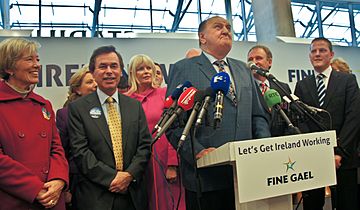Alan Shatter facts for kids
Quick facts for kids
Alan Shatter
|
|
|---|---|
 |
|
| Minister for Justice and Equality | |
| In office 9 March 2011 – 7 May 2014 |
|
| Taoiseach | Enda Kenny |
| Preceded by | Brendan Smith (Justice and Law Reform) |
| Succeeded by | Frances Fitzgerald |
| Minister for Defence | |
| In office 9 March 2011 – 7 May 2014 |
|
| Taoiseach | Enda Kenny |
| Preceded by | Éamon Ó Cuív |
| Succeeded by | Enda Kenny (acting) |
| Teachta Dála | |
| In office May 2007 – February 2016 |
|
| In office June 1981 – May 2002 |
|
| Constituency | Dublin South |
| Personal details | |
| Born | 14 February 1951 Rathgar, Dublin, Ireland |
| Political party |
|
| Spouse |
Carol Ann Danker
(m. 1982) |
| Children | 2 |
| Education | The High School, Dublin |
| Alma mater | Trinity College Dublin |
Alan Joseph Shatter (born 14 February 1951) is an Irish lawyer, author, and former politician. He was a member of the Fine Gael party for many years. He served as the Minister for Justice and Equality and the Minister for Defence from 2011 to 2014.
He was a Teachta Dála (TD), which is a member of the Irish parliament, for the Dublin South area. He was a TD from 1981 to 2002 and again from 2007 to 2016. In 2018, he left Fine Gael and became an independent politician.
Alan Shatter has written several books, including Life is a Funny Business (2017), Frenzy and Betrayal (2019), and Cyril's Lottery of Life (2023). He also writes opinion articles for newspapers like The Irish Times and the Irish Independent.
Contents
Personal life and education
Alan Shatter was born in Dublin to a Jewish family. His parents, Elaine and Reuben, were from England. He went to The High School in Dublin and later studied at Trinity College Dublin. As a young man, he spent two months working on a kibbutz, a type of community farm, in Israel.
He has lived in Dublin for most of his life. He grew up in the areas of Rathgar and Rathfarnham. Today, he lives in Ballinteer with his wife, Carol Ann. They have two grown-up children.
Legal and writing career
Before becoming a full-time politician, Alan Shatter was a lawyer. He was a partner in a law firm called Gallagher Shatter from 1977 to 2011. As a lawyer, he was involved in many important cases in Ireland's High Court and Supreme Court.
He wrote a very important book about Irish family law. In his book, he argued for big changes to the laws about families and marriage. Later, as a politician, he helped make many of those changes happen.
He was also the chairperson of the Free Legal Advice Centres (FLAC). FLAC gives free legal help to people who cannot afford it. He has also written novels and other books.
Political career
Alan Shatter's political career began in 1979 when he was elected to the Dublin County Council. He was first elected to the Dáil, Ireland's main house of parliament, in 1981.
As a TD, he was known for introducing many "private member's bills." These are proposed laws written by politicians who are not government ministers. One of his bills became the Judicial Separation and Family Law Reform Act of 1989. This law made major changes to family law in Ireland. Another of his bills became the Adoption Act of 1991, which allowed adoptions from other countries to be recognized in Ireland for the first time.
Over the years, he held many important roles in his party, Fine Gael. He was the party's spokesperson on topics like justice, health, and defence.
Minister for Justice and Defence (2011–2014)
In March 2011, the leader of the government, Taoiseach Enda Kenny, appointed Shatter to two important jobs at the same time. He became the Minister for Justice and Equality and the Minister for Defence.
What did he do as Minister for Justice?
As Minister for Justice, Shatter led many reforms. He introduced nearly 30 new laws. One of his biggest changes was creating Ireland's first-ever citizenship ceremony. These ceremonies are special events where people officially become Irish citizens. He also cleared a huge backlog of applications, helping 69,000 people become citizens.
He also created a plan to help the women who had been forced to work in the Magdalene Laundries. The government created a fund to pay them money and offered an official apology for how they were treated.
Shatter also started a major reform of the legal profession. He wanted to make legal services cheaper and create more competition. He also began the process of creating a new Court of Appeal to help the court system work better.
What did he do as Minister for Defence?
As Minister for Defence, Shatter made changes to the Irish Defence Forces. He made sure the army had enough money to keep 9,500 soldiers, even during a difficult financial time. He supported Ireland's role in international peacekeeping missions.
He also signed contracts to buy new ships for the Irish Naval Service. These ships have since been used to rescue people in danger in the Mediterranean Sea. In a historic move, he granted a pardon to Irish soldiers who had left the army during World War 2 to fight against Nazi Germany. He also gave a state apology for how they had been treated after the war.
Controversies and resignation
During his time as minister, Shatter was involved in several controversies.
One issue was about how the Garda Síochána (the Irish police) handled traffic tickets. There were claims that some tickets were cancelled unfairly. A police officer, known as a whistleblower, brought these issues to public attention. A whistleblower is someone who exposes problems inside an organization.
Another controversy was about whether the offices of the Garda watchdog (GSOC) had been bugged or spied on. An investigation later found no evidence of bugging.
These issues, along with others, led to a lot of pressure from the media and other politicians. In May 2014, a report by lawyer Seán Guerin was published. It was critical of how Shatter had handled the complaints from the police whistleblower. After the report came out, Alan Shatter resigned from his roles as Minister for Justice and Defence.
After his resignation
Shatter felt that the Guerin Report was unfair because he was never interviewed for it. He took his case to court. Years later, in 2019, the Supreme Court agreed with him. The court ruled that the report was wrong to criticize him and that his rights had been violated.
Another investigation, called the O'Higgins Report, was published in 2016. This report found that Shatter had actually handled the whistleblower's complaints properly and reasonably.
In 2023, Taoiseach Leo Varadkar made a statement in the Dáil. He acknowledged that Shatter had been vindicated by the O'Higgins Report and the Supreme Court. He said that Shatter "was not fairly treated by an organ of the state."
Alan Shatter ran for election again in 2016 but lost his seat in the Dáil.
 | Toni Morrison |
 | Barack Obama |
 | Martin Luther King Jr. |
 | Ralph Bunche |


